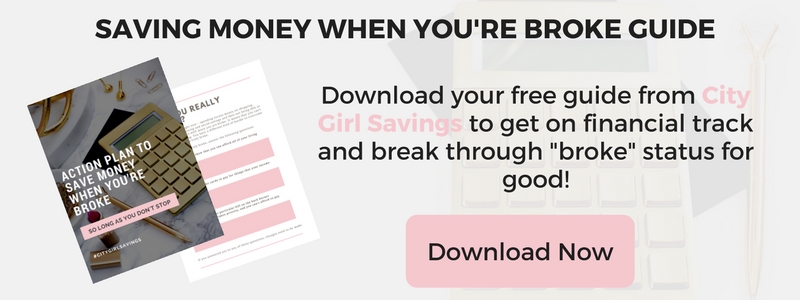Most budgeting issues are caused by 2 problems: a spending issue or an income issue. A spending issue means someone makes enough money to cover their bills, expenses, savings and moderated fun spending, however they overspend on things they don’t need, so it feels like they don’t make enough money. An income issue means someone doesn’t make enough money to cover their bills and living expenses. This leads to debt, late payments and bigger problems.
While both issues take effort to fix, if your spending is under control, making more money will only help your situation. If you’re unsure if your problem is income related, I’m sharing 5 signs your current income isn’t cutting it. When you know that income is the problem, you can go out and proactively seek more.
5 Signs Your Current Income Isn’t Cutting It
#1 Your budget tells you your current income isn’t cutting it
One of the best ways to know if your current income is enough for your situation is to get a budget created. Your budget should show what money is coming in, what money is going out, and what’s left over. When you list out all your bills, expenses, and spending categories, you can easily identify if your income covers those things. If it does, then your problem is likely spending, not income.
If your income does not cover all your bills, expenses, and spending, first make sure you don’t have any egregious amounts allocated to non-necessary spending. For example, if your income is $200 short, but you have $1000 allocated to going out to eat, your income is fine, you just spend more than you need to.
It can take some trial and error, but your goal is to make sure your monthly income covers your monthly bills, expenses, and reasonable spending. If it does, then you’re in good shape. If not, your focus should be on making more money.
#2 If an unexpected expense came up, you’d be screwed
Maybe your budget proves that you make just enough to cover all your bills and spending. However, if something unexpected were to come up, you’d have to use a credit card because there’s no room for error. This is a sign your current income isn’t cutting it. You should have room in your budget for something to come up, or you should have room in your budget to save money in case something comes up.
If your income doesn’t allow for either of those things, you will want to reassess your numbers. Can you cut back on some non-necessary spending to save more? Can you allocate some income to “Miscellaneous” spending to proactively handle unexpected expenses? The goal is for you to be able to handle an unexpected expense without throwing your budget out the window.
#3 Saving money is an impossible task
With your current income, you should be saving money on a regular basis. This money should be saved without you having to touch it (unless something comes up). What I mean is, you don’t want to put $200/month into savings but always take it out because you need it for bills and spending. You should be putting an amount into savings regularly that doesn’t need to be touched.
Once again, this is where your budget can be very helpful. Your budget will show how much you can afford to put into savings and not touch it. If you’re saving without strategy, you run the risk of saving too much money – which comes with its own set of problems.
#4 You need credit cards for basic living expenses
Credit cards should only be used when they can be paid in full every month. You should not be carrying balances on your credit cards – that is a losing battle. With interest rates as high as they are, you could end up spending so much more than you want (or need) to pay down your credit cards.
Your current income isn’t cutting it if you’re forced to use credit cards for basic living expenses. If you don’t have enough in your checking account that you have to rely on credit cards to get by until the next payday, that’s a problem.
Now, I will say there’s nothing wrong with using credit cards for normal spending, as long as it’s budgeted for, and you can pay the balances off every month. In that case, you’re able to take advantage of credit card rewards and points, which can help you save money.
#5 There’s no room in your paycheck for helpful deductions
Are you contributing to a 401k plan? Are you taking advantage of your company’s H.S.A or F.S.A? If the answer is no, and your paychecks feel tight, your income may not be cutting it. Contributing to a 401k plan is an absolute must. If you can’t afford to do so at this time, and the issue isn’t related to spending, your goal should be to make more money.
It will also benefit you in the long run to be able to take advantage of other helpful deductions. Things like commuter benefits, child-care reimbursement, or health spending accounts. You should be able to contribute reasonable amounts to those benefits and still have enough to cover your normal bills and spending.
Related: How to Tell if Your Income is Enough for Your Situation
Understanding your issues with money starts with your budget. If your budget shows you can afford everything, plus save for goals and enjoy life in moderation, then your spending needs to be worked on. If your budget shows you can’t afford your normal living expenses, then your income needs to be increased. Once you know better, you can work to be better. Have you determined if you have an income or spending problem? What changes have you started implementing to improve your situation? Drop a comment to share!
-Raya
The CGS Team






